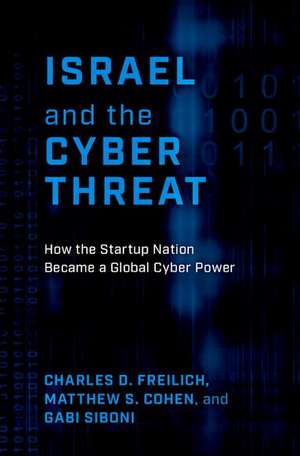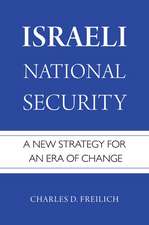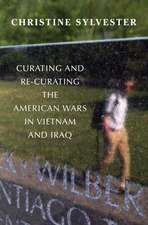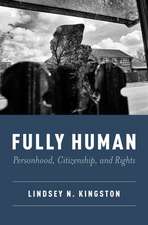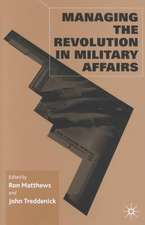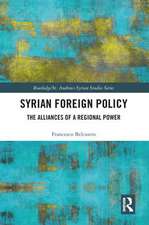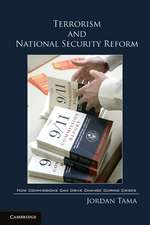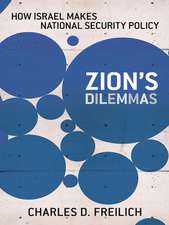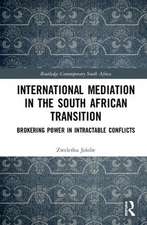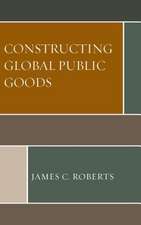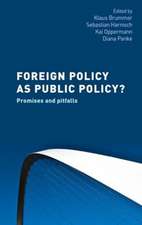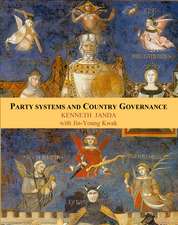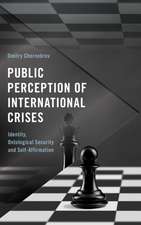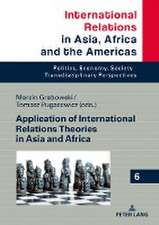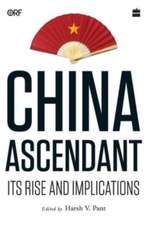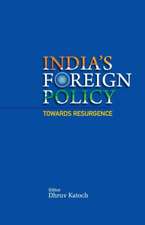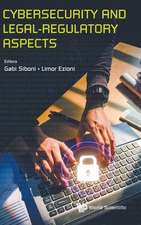Israel and the Cyber Threat: How the Startup Nation Became a Global Cyber Power
Autor Charles D. Freilich, Matthew S. Cohen, Gabi Sibonien Limba Engleză Hardback – 28 sep 2023
Preț: 205.68 lei
Preț vechi: 233.88 lei
-12% Nou
Puncte Express: 309
Preț estimativ în valută:
39.37€ • 42.78$ • 33.09£
39.37€ • 42.78$ • 33.09£
Carte disponibilă
Livrare economică 20-26 martie
Livrare express 15-21 martie pentru 66.78 lei
Preluare comenzi: 021 569.72.76
Specificații
ISBN-13: 9780197677711
ISBN-10: 0197677711
Pagini: 440
Ilustrații: 6 b/w line drawings; 2 maps
Dimensiuni: 236 x 165 x 37 mm
Greutate: 0.74 kg
Editura: Oxford University Press
Colecția OUP USA
Locul publicării:New York, United States
ISBN-10: 0197677711
Pagini: 440
Ilustrații: 6 b/w line drawings; 2 maps
Dimensiuni: 236 x 165 x 37 mm
Greutate: 0.74 kg
Editura: Oxford University Press
Colecția OUP USA
Locul publicării:New York, United States
Recenzii
Cyber has become the equivalent of a silent nuclear weapon, the ultimate weapon that can simply take countries apart. Israel has a remarkable story to tell in the cyber realm, civil and military, and this ground-breaking study tells it better than any other. A must read for anyone interested in cyber and Israel.
Cyber has become one of the top threats facing Israel today and it has built a remarkable civil cyber ecosystem and strong military capabilities in response. This book is the most comprehensive, exhaustive and up-to-date analysis of the issue, with critically important conclusions and recommendations for policy. Highly recommended.
This book is the result of detailed research about Israel's cyber arena, from its early steps to its current global lead, a story about people, strategies and politics. As one who led part of this story, wrote about it and supported this research effort, it is essential reading for scholars.
This is a startling, comprehensive, and deeply researched look at one of the top cybersecurity programs in the world. Israel is easily among the top five countries in terms of capability and depth of research, and this volume is a gold standard of accuracy and judgement.
This book is a pioneering contribution to the nascent field of comparative cyber studies. It will be the authoritative reference on cybersecurity in Israel for years to come. The authors draw on impressive detail, grounded in practical experience, to show how Israel's unique strategic culture informs its cyber policies.
Suffice it to say that Freilich, Cohen and Siboni's book...Their work, in short, is a must read for anyone, professional or layperson, interested in this particular dimension of Israel's national security experience.
Israel and the Cyber Threat is a timely book that deserves a wide audience in the United States and its allies.
For those looking for a detailed strategic and pragmatic approach to cybersecurity, this is their book.
Israel and the cyber threat: How the startup nation became a cyber power traces the steps by which that goal was attained. It explains why and how Israel became a world-class cyber power and demonstrates the various advantages (economic, military, and diplomatic) that it has thereby gained. Finally, from what is obviously a sense of deep national commitment, the authors, Charles Freilich, Matthew Cohen, and Gabi Siboni, also itemize the additional organizational, entrepreneurial, and educational steps required to sustain the upward trajectory of success.
Cyber has become one of the top threats facing Israel today and it has built a remarkable civil cyber ecosystem and strong military capabilities in response. This book is the most comprehensive, exhaustive and up-to-date analysis of the issue, with critically important conclusions and recommendations for policy. Highly recommended.
This book is the result of detailed research about Israel's cyber arena, from its early steps to its current global lead, a story about people, strategies and politics. As one who led part of this story, wrote about it and supported this research effort, it is essential reading for scholars.
This is a startling, comprehensive, and deeply researched look at one of the top cybersecurity programs in the world. Israel is easily among the top five countries in terms of capability and depth of research, and this volume is a gold standard of accuracy and judgement.
This book is a pioneering contribution to the nascent field of comparative cyber studies. It will be the authoritative reference on cybersecurity in Israel for years to come. The authors draw on impressive detail, grounded in practical experience, to show how Israel's unique strategic culture informs its cyber policies.
Suffice it to say that Freilich, Cohen and Siboni's book...Their work, in short, is a must read for anyone, professional or layperson, interested in this particular dimension of Israel's national security experience.
Israel and the Cyber Threat is a timely book that deserves a wide audience in the United States and its allies.
For those looking for a detailed strategic and pragmatic approach to cybersecurity, this is their book.
Israel and the cyber threat: How the startup nation became a cyber power traces the steps by which that goal was attained. It explains why and how Israel became a world-class cyber power and demonstrates the various advantages (economic, military, and diplomatic) that it has thereby gained. Finally, from what is obviously a sense of deep national commitment, the authors, Charles Freilich, Matthew Cohen, and Gabi Siboni, also itemize the additional organizational, entrepreneurial, and educational steps required to sustain the upward trajectory of success.
Notă biografică
Charles D. ("Chuck") Freilich, a former deputy national security adviser in Israel and long-time senior fellow at Harvard's Belfer Center, teaches political science at Columbia University, New York University, and Tel Aviv University. He is the author of Zion's Dilemmas: How Israel Makes National Security Policy (2012) and Israeli National Security: A New Strategy for an Era of Change (Oxford, 2018 and Modan Press in Hebrew). Freilich is the senior editor at the Israel Journal for Foreign Affairs, has published numerous academic articles and over 170 op-eds, and appears frequently on US, Israeli and international TV and radio stations.Matthew S. Cohen is Assistant Professor of Practice at Merrimack College. He was previously employed at the federal, state, and local levels in America, focused on policy work. Cohen's research is focused on emerging security threats. He has published on cyber-space, international relations theory, Israeli security policy, delegitimization and lawfare, Turkish-Israeli relations, Turkish politics, and Russian politics.Gabi Siboni is a former colonel in the Israel Defense Forces, a senior research fellow at the Jerusalem Institute for Strategy and Security, and a consultant to the IDF and other Israeli defense organizations, including as the chief methodologist of the IDF's Research Center for Force Deployment and Buildup. He is the coauthor of National Strategy in Cyberspace (2016), Regulation in Cyberspace (2018), Guidelines for Israel's National Security Strategy (2019), and Cybersecurity and Legal-Regulatory Aspects (2021). Siboni was the director of both the Military and Strategic Affairs and Cyber Security Programs at the Institute for National Security Studies (INSS), where he also edited the Institute's academic journals in these areas.
